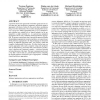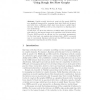1634 search results - page 8 / 327 » Reasoning about Knowledge Using Rough Sets |
ATAL
2007
Springer
14 years 1 months ago
2007
Springer
Agents that must reach agreements with other agents need to reason about how their preferences, judgments, and beliefs might be aggregated with those of others by the social choic...
RSCTC
2004
Springer
14 years 1 months ago
2004
Springer
Abstract. Many learning methods ignore domain knowledge in synthesis of concept approximation. We propose to use hierarchical schemes for learning approximations of complex concept...
JANCL
2006
13 years 7 months ago
2006
This paper describes an experimental platform for approximate knowledge databases called the Approximate Knowledge Database (AKDB), based on a semantics inspired by rough sets. The...
EWCBR
2006
Springer
13 years 11 months ago
2006
Springer
Feature selection algorithms can reduce the high dimensionality of textual cases and increase case-based task performance. However, conventional algorithms (e.g., information gain)...
RSFDGRC
2005
Springer
14 years 1 months ago
2005
Springer
Pawlak recently introduced rough set flow graphs (RSFGs) as a graphical framework for reasoning from data. Each rule is associated with three coefficients, which have been shown t...


